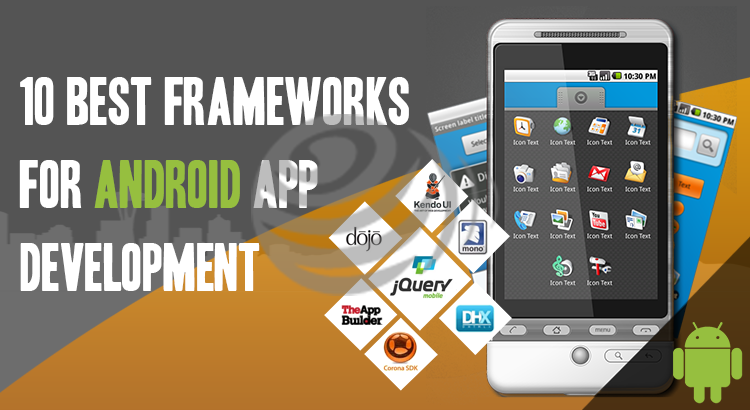Are you working on developing Android-based games or complex apps with extensive cloud integration? Well, in that regard you would certainly be interested in looking out for some native application development tools. It varies from the Java-oriented Android SDK and Android Development Tools (ADT) Eclipse plugin to game-oriented engines like Corono to commercial platforms such as cloud-oriented Monaca toolsuite.

There are a number of mobile apps that are quite simple, however with tight deadlines and budgets and the requirement to support both Android and iOS. When it comes to Android app development, in most cases cross-platform mobile app frameworks make for a better option, particularly in case of converting web apps to mobile. With most mobile frameworks, there is an assurance for some native-like performance and functionality as it still hews to a basic “write once, run anywhere” development approach.
Here we are going to explore the 10 best Android-compatible mobile app frameworks that support HTML5 or JavaScript, and it also supports CSS. These are also open source offering at least some version of a free app, while most programs listed here are both free and open source while also supports Linux desktops as well as Windows and/or OS X.
Top 10 open source frameworks
Framework 7, from iDangero.us — Version 1.0 came out last year and the Framework has just been among the best choices for developing iOS apps. It also offers Android support and happens to be a good option if you are keen on starting with iOS and then build an Android version with an iOS like look and feel. Features include Material Design UI, native scrolling, 1:1 page animation, a custom DOM library, and XHR caching and preloading.
Ionic, from Ionic — Ionic is based on the Sass CSS extension language and this popular cross-platform framework is certainly easy to use and can integrate AngularJS to build more advanced apps. You get a library of mobile-optimized HTML, CSS, and JS CSS components, gestures, and tools, and works with predefined components. There is a command-line interface offering features like emulators, live reload, and logging, There’s also a Cordova-based app packager.
jQuery Mobile, from jQuery Foundation — This one is mature, lightweight framework that lacks many of the advanced features of most packages here, but it still has a large, committed user base. You get features like semantic markup, progressive enhancement, themable design, and PhoneGap/Cordova support, there’s not much here for native-like functionality and performance or advanced UI. Additionally, its simplicity means that “write once, run anywhere” is often an achievable goal, and it’s a good choice for simple apps that needs to be run on Windows Phone and BlackBerry.
Kendo UI, from Telerik — This jQuery based HTML5/JavaScript framework comes in open source and commercial versions. This is enterprise-friendly offering a wide selection of UI widgets and plugins, and is recognized for its numerous prebuilt themes with Material Design styling, as well as a theme builder for custom themes. Other features include Angular and Bootstrap UI integration, as well as performance optimizations.
Mobile Angular UI, from Maurizio Casimirri — It combines AngularJS and a modified version of Twitter’s Bootstrap into a mobile UI framework and retains most of Bootstrap 3’s syntax for easier web-to-mobile portability while adding mobile components missing from Bootstrap, such as switches, overlays, sidebars, scrollable areas, and fixed-positioned navbars. Libraries include fastclick.js and overthrow.js.
NativeScript, from Telerik — NativeScript emphasizes on native UX development, while also offers cross-platform code-sharing support across Android and iOS. The software uses existing native UI libraries, with the UI described by means of JavaScript, XML, or optionally Angular. Quite tough, Telerik is more traditional cross-platform Kendo UI framework, however.
Onsen UI, from Asial Corp. — Built on HTML and CSS, Onsen is designed to work with PhoneGap and Cordova that’s not pre-integrated and can also work with Angular and jQuery. This program stresses UI development, and offers varying web-based UI components and features, such as two-column views for tablets. (Material Design, however, is still missing.) The well-documented program is pitched at jQuery
React Native, from Facebook — This open source spin off of Facebook’s React JavaScript framework famously replaced the earlier HTML5 foundation. Its high-end iOS-focused program that’s more of a native app package than a cross-platform framework, but comes with its new Android support and simply meets our requirements, thus you can write once in JavaScript and port to both platforms. Currently, only OS X desktops are fully supported, still there are experimental Linux and Windows versions for Android development.
Sencha Touch, from Sencha — Sencha’s mature, enterprise-focused HTML5/JavaScript framework is available in both open source and commercial versions. It builds upon ExtJS to enable native-like performance, offering a visual app builder for HTML5, and has the ability to reuse custom components. A native packager streamlines distribution to stores like Google Play.
Titanium, from Appcelerator — Titanium uses JavaScript to create native code, with claimed benefits in performance. This Node.js-based SDK offers over 5,000 APIs for iOS, Android, Windows, Blackberry, and HTML5. It’s best known for its performance and extensive feature set than for ease of use. The software is open source, however the full-featured free version is free only until an app is published, at which point you have to pay at least $39 per month.




I do not even know how I stopped up here, but I thought this submit was great.
I do not know who you might be but definitely, you are going to a well-known blogger if you happen to aren’t already. Cheers!
Our link-building solutions are the essential element of our Search engine optimization campaigns. Our innovative group works with you to determine your inbound link creating targets.